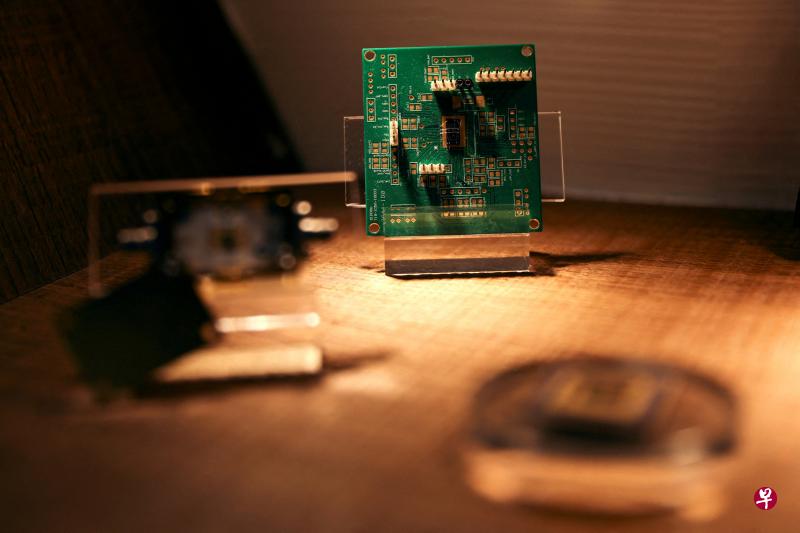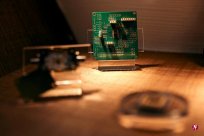
The United States has recently adopted a policy to make the chip production achieve self -sufficient.ZBO_intro> and without covering up the intention to restrain and even stifle the development of the Chinese chip industry. Some Chinese officials strongly advocate the implementation of a 1 trillion yuan incentive plan to promote the development of the chip industry, But in the situation where the epidemic slows down, China may seek to support local chip merchants. The macro of the United States to attract allies to support the chip industry's re -layout, and has stirred up the opposition in the enterprise, Class = zbo_intro> Dutch chip equipment giants directly pointed out that the company has "sacrificed enough". China has filed a lawsuit in the World Trade Organization, saying that the United States abuse export control measures, Will the battle of this chip be the ultimate victor?
In order to ensure the stability of the chip supply, the United States Biden government cooperates with Taiwan's accumulated circuit manufacturing company (TSMC, TSMC), the world's largest semiconductor founder.Production scale.
TSMC builds two factory buildings in Phoenix City, the capital of Arizona, USA. The first phase of the plant is expected to mass production in 2024.The total investment of the two -phase project is about 40 billion US dollars (about S $ 53.5 billion), respectively, 5nm and 3 -nanometer high -end chips, respectively.
South Korea's Samsung Electronics Company will spend $ 17 billion in chip factories built in Taylor, Texas, USA, and are scheduled to begin operations in the second half of 2024.Intel, the largest chip manufacturer in the United States, invested $ 20 billion and set up a new plant in Ohio.Intel introduced semiconductor manufacturing into Arizona in 1980, setting up the first chip manufacturer, driving the construction of the "Silicon Desert" in Arizona.
U.S. President Biden announced in the migration ceremony of the TSMC wafer fab in Phoenix in December last year that "these chips may change the rules of the game." Bynden thanked TSMC's founder Zhang Zhongmou, but some Taiwanese netizens questioned this as follows.It is said that TSMC may have to be renamed "Meiji Power."
TSMC is a chip tailor -made computer, mobile phone, fifth -generation communication system (5G) and artificial intelligence products for large technology factories, such as Apple, Intel, Super Wey, Huida.
Zhang Zhongmou founded TSMC in 1986. More than 10 years ago, he had a plan to set up a factory in the United States.It is almost dead, free trade is almost dead ", and it is unlikely to recover.
Global technology supply chain or two camps lead to worry
The tension between China and the United States on the chip problem has triggered concerns about the global technology supply chain that may be divided into two camps, and it also makes companies like TSMC become more and more difficult to provide Chinese customers.
Some comments refer to the US factories with high production costs in the United States to attract or pressure TSMC and Samsung, which does not meet the cost of corporate costs.This is the trend of "against globalization."
Advanced equipment is banned for sale of the Chinese Dutch giants shouting "surrender"
Opponents also refer to the United States on the loss of interests in the ally.Asml Holding NV, a Dutch semiconductor equipment manufacturer, complained about economic losses.
Asmore CEO Peter Wennink said the company had "sacrificed enough" for the previous existing sales ban.
The Netherlands and Japan are the two largest advanced semiconductor equipment suppliers in the world except the United States.He said that about the prohibition of the Extreme Ultra-Violet of Extreme Ultra-Violet, Asmore "can only surrender", which benefited from the American chip equipment manufacturer.The market, currently only 15 % of Asmore's sales.
Analysis: The U.S. government abandon 40 years of free market operation policy
Regardless of whether the globalization of economic and trade has been dead, some analysts believe that from the United States gangs, it is necessary to reconstruct the semiconductor ecosystem with the allies to show that its thinking has changed significantly.The U.S. government is gradually abandoning the policy of relaxing control and tax cuts in the past 40 years to make a clear industrial strategy in changing the market, which has changed its funds to attract private investment.
The BBC reported that TSMC's establishment of American factories, and 2022 chips and technology bills are the first steps for this industrial strategy.The total amount of this bill is US $ 280 billion, including $ 52 billion to support computer chip manufacturing companies.
There is an analysis that the interdependence relationship is unchanged
Some analysts believe that the interdependent relationship between semiconductor products will not change, and it is impossible for the United States to lead separately.
U.S. President Biden also proposed the idea of establishing a "chip Quartet Alliance" (Chip 4) to South Korea, Japan and Taiwan in March last year.The supply is constantly chain.Among them, Taiwan and South Korea have implemented plans to set up factories in the United States.
People's Daily quoted reports from South Korean media that South Korean Foreign Minister Park Zhen Park Zhen visited China last August, and reported to the Chinese government to participate in the "chip Si -Party Alliance" preparatory consultation meeting to the Chinese government.South Korea pointed out that joining the league is by no means a need for China, and South Korea can play a bridge role in China.
Japan and the United States summit will be held in Washington on January 13.It is expected that the Japanese -American summit talks and ministerial meetings will confirm the cooperative relationship. The fastest spring will summarize the specific measures to strengthen talent training. In terms of artificial intelligence and supercomputers, the next generation of technologies will be complementary to the field.This also intends to lead the world in the indispensable semiconductor technology of these industries.
In addition to cross -border "chip alliances", in the past 18 months, the United States has also greatly increased investment in the chip industry in the country.The Bayeng government has provided at least 760 billion US dollars, tax credits, and other subsidies to promote domestic chip production.According to data from the US Semiconductor Industry Association, since the spring of 2020, 35 companies have promised to invest nearly $ 200 billion in chip -related manufacturing projects.
Span class = zbo_subheading> Scholars: Most of the dollar investment chip may not be self -sufficient
However, Chris Miller, an associate professor of the School of International History of the Floche Law and Diplomat of the University of Tofz, pointed out that the United States has invested a lot of funds to the chip industry to fully achieve the goal of self -sufficiency.
Miller is a chip war: Author of the world's most critical technical dispute.He explained in an interview with the US Think Tank Foreign Relations Association that chips widely used in cars and home appliances, 31 % in Taiwan and 23 % in China, but he emphasized that not all chips can easily replace another product with another product.The lack of a chip will make the entire car be unable to complete the factory.At the end of 2020, global vehicle chips are out of stock, which affects the supply to explain this.
He pointed out that if Taiwan is in a geopolitical crisis, it takes several years to restore Taiwan's production capacity outside the shore. It is because the equipment for producing chips is precision equipment, and the equipment itself must be operated by chip.The losses of global manufacturing are estimated to be trillions of dollars.
The US government's chip bill is clearly aimed at "de -Taiwanization" and is also "de -Chinese".China itself is also focusing on the research and development of high -end chips to alleviate this strategic "bottleneck", but it has little effect.Miller pointed out that making advanced semiconductors is the most complicated and precise manufacturing process in human history.It is not surprising that manufacturers outside Taiwan cannot copy Taiwan for a while.
Analysis: The "de -Chineseization" policy promotes China to surpass the United States
While trying to adjust the global semiconductor production pattern, the US government has not covered its intention to restrain and even stifle the development of the Chinese chip industry.The US technology company that accepts government funding support in 2022 chips and technology bills is not allowed to build factories with advanced technologies in China, and the ban is valid for 10 years.
The "de -Chinese" policy in the United States may have achieved unexpected results.An article published by the "Information Network" president of the Global Microelectronics Industry Market Research Company, Robert N. Castellano, said that US sanctions, entity lists and chip bills did not hinder China, but instead strengthened China to surpass the United States beyond the United Statesdetermination.He said that the Chinese chip industry leader "SMIC" has been able to produce 7 nanometer chips, while domestic equipment suppliers in China are manufacturing equipment to produce 5 -nanometer chips and sell them to foreign chip companies.
The British Daily Telecommunications report also said that China has made major technical breakthroughs and has mastered chip design technologies that could only be achieved in the West before.The report quoted patent application documents that Huawei Technology Co., Ltd. has made significant progress in manufacturing the smallest and most advanced chip, which has opened the door for Chinese enterprises to make progress.
However, the crown disease epidemic has curbed China's economy and fiscal capabilities, and it has to make a huge sum of money to build the country's chip industry and fight with the United States.The development of the chip industry to challenge the United States leading position and ensure that China's military capabilities are one of the main Chinese officials.Bloomberg quoted anonymous people that some officials still worked hard to implement an incentive plan of RMB 1 trillion (about S $ 194.6 billion). However, due to the failure to achieve the expected effect of providing high subsidies, top officials are discussing alternatives.Discuss whether to support local chip producers by reducing other methods such as semiconductor material costs.
The shortage of chip supply required for semiconductor once made car manufacturers and other downstream customers difficult.More than 90 % of the cutting -edge chips below the world's most advanced 10 -nanometer process are made for Taiwan. Because Taiwan, this semiconductor hotspot is also a geopolitical detonation point. In order to ensure supply, the government of many large powers is also investing in huge amounts of funds from the chip industry.The chip capacity plan to restore "technical sovereignty".
According to the data of the "New Street Research" in the global telecommunications and technology information analysis company, in order to achieve this, China, the United States, European Union, Japan, and India have promised subsidies provided in the next 10 yearsAs high as $ 190 billion.
Taking the European Union as an example, as early as November last year, the EU countries began to promote 43 billion euros (about S $ 60.638 billion) to allocate a funding plan to strengthen semiconductor production and become a global semiconductor center.The EU's grand goal is to share 20%in the global semiconductor market by 2030.At present, the United States, which accounts for 12%of the global market.
The United States has introduced policies to the establishment of a local semiconductor ecosystem and requires allies to cooperate, which has brought chills to the global electronics industry.The U.S. Department of Commerce's Industry and Security Agency can issue export permits to any entity outside the domain in accordance with foreign product rules and prevent it from being regarded as a sales of US business or strategic interests.A report on December 11 last year stated that the US government imitated China's state -owned system by competing for control over the free market.
TSMC: Excessive export control Destroy global efficiency
The President of TSMC Wei Zhejia warned that excessive government export control may weaken mutual trust and cooperation between the country.Wei Zhejia said on December 17 last year in an industry activity in Taipei: "Export control and ban on products of other countries destroy the productivity and efficiency brought about by globalization, or at least reduce the benefits of the free market." He called on politics.People propose to replace solutions.
China has filed a lawsuit in the World Trade Organization in mid -December last year, stating that the United States has continuously generalized the concept of national security in recent years, abused export control measures, and hindered the normal international trade of products such as chips.The Chinese Ministry of Commerce announced that these measures are typical trade protectionism, threatening the stable supply chain of the global industrial chain, endangering its foundation in the US $ 580 billion semiconductor industry.
With the help of the WTO mechanism to solve disputes is a hurry.After China filed a lawsuit, the United States had 60 days of consultation.If the problem cannot be solved, Beijing can require the WTO to set up a group.The WTO may take several years to make a decision.Even if China win the lawsuit, the United States can appeal, and the WTO is unable to force the United States to change its actions.
However, U.S. Secretary of State Broskens released more positive information on January 1.He was tweeted that he had a phone call with the newly appointed Chinese Foreign Minister Qin Gang, discussed bilateral relations, and would "keep the communication channels unblocked."
U.S. State Department spokesman Ned Price later explained to reporters that the United States' attitude towards China is based on the interests of the United States. This is a competitive relationship. Among them, But there will be profound differences, even hostility in some areas.Therefore, the United States is not paying attention to anyone, but how to manage this extensive bilateral relations in a constructive manner.This is not only in line with the interests of the United States, but also the expectations of other countries.



